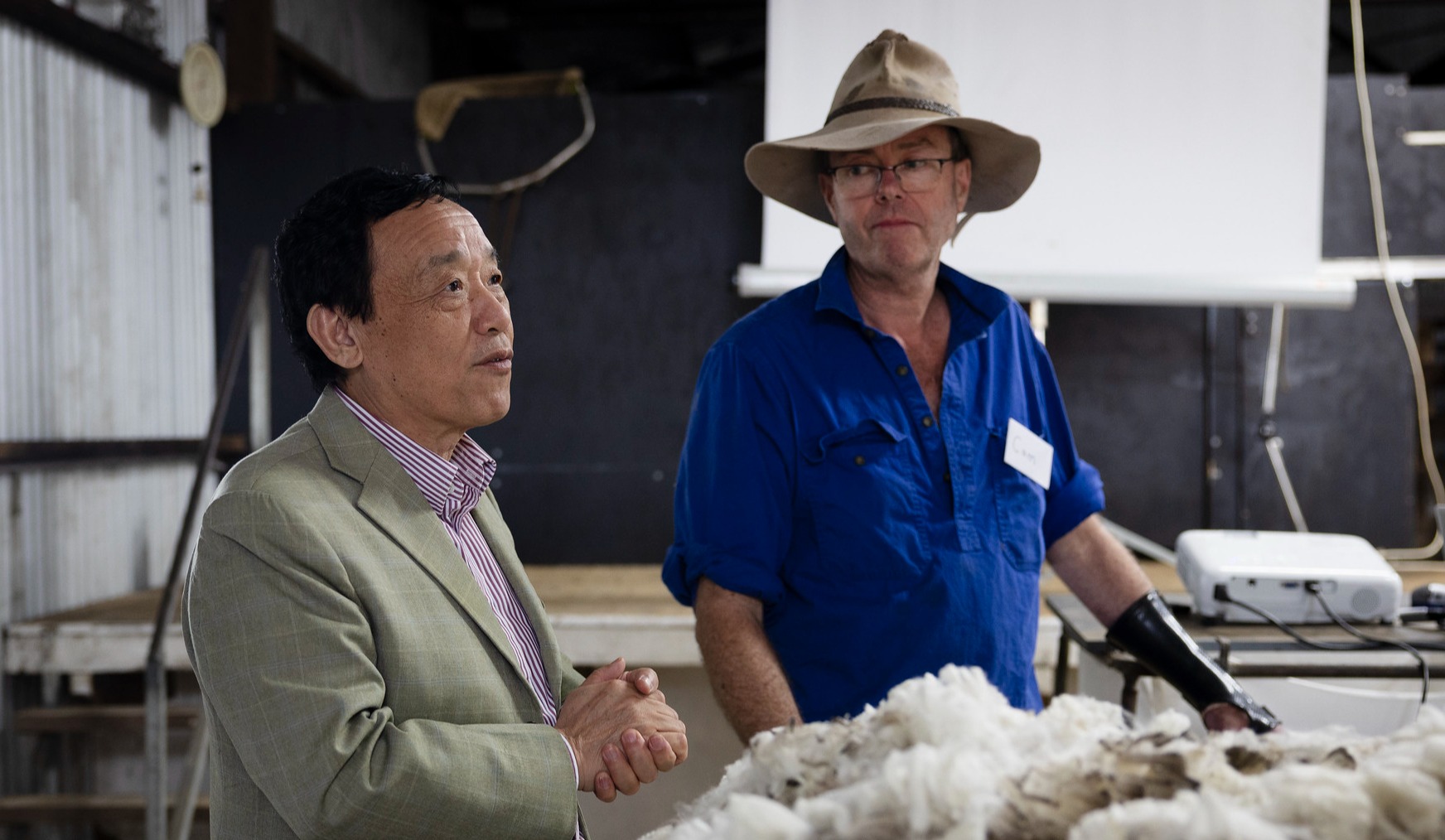In Australia, FAO Director-General visits farms, research institutes and meets with Minister of Agriculture, Fisheries and Forestry

©FAO/Stephanie Simcox
Canberra - FAO Director-General QU Dongyu wrapped up an official visit to Australia, during which he visited innovative farms, research institutes and met with the country’s Minister of Agriculture, Fisheries and Forestry, Julie Collins.
Before leaving Australia’s Federal Capital, the Director-General visited the Australian National University (ANU). The Director-General paid tribute to Australia’s passionate young farmers and emphasized the need to focus on data collection and sustainable development. Additionally, he underscored the importance of enhancing food diversity, accessibility, and affordability to drive agrifood systems transformation.
He also held a meeting with Julie Collins, Minister of Agriculture, Fisheries and Forestry, in which they discussed Australia’s productive agriculture sector and its strong ties with FAO. The Director-General emphasized the importance of data, innovation, and strategic land use, proposing that Australia share its successful practices and expertise in sustainable agriculture, while the Minister expressed enthusiasm for continued collaboration.
Earlier, in Tasmania, the Director-General visited the Institute for Marine and Antarctic Studies and the Blue Economy Centre for Cooperative Research (BECRC). The Director-General noted that the research center’s mechanism could be strengthened by integrating scientific innovation, technology research, and policy to amplify its impact.
While in Tasmania, the FAO Delegation also visited a mixed operation farm, Elverton Pastoral Pty Ltd, in Blessington, with beef, sheep, cropping and forestry activities. The Director-General saw how the owners have been working to restore the run-down pastures and forests to a sustainable enterprise with livestock management used as a tool.
The FAO Delegation went on to visit Fairfield, Ben and Stephanie Tait farm focused on drought resilience and an innovation hub. They heard about the work conducted there on water management and drought preparedness, as well as irrigation and agritech.
After visiting one of Australia’s largest cherry exporters, the Director-General continued to Pooley Wines, a leading cool-climate vineyard and Tasmania’s first certified environmentally sustainable vineyard. He met with local winemakers and representatives from Wine Australia and Wine Tasmania to discuss the industry's quality, sustainability, climate challenges, and innovations.
Among the innovative farms which the Delegation visited earlier in the state of Victoria, Ellinbank SmartFarm, about 115 km southeast of Melbourne, focuses on boosting productivity and environmental sustainability through improvements in measuring, managing and utilizing the homegrown feed base; improving the health and welfare and longevity and lifetime performance of cows; and sustainably increasing annual milk production per cow.
The Farm provided an insightful look into the evolving landscape of dairy innovation. Additionally, the Director-General suggested that Ellinbank consider such products as camel and buffalo milk, which could contribute to the broader global market, where diverse dairy options are increasingly valued.
The FAO Director-General’s delegation also visited a family dairy farm, run by Lauren and Simon Finger, where they witnessed innovative work, including on dairy production on multispecies pasture systems.
The Director-General noted the Fingers' integrated approach to land, soil, and livestock management, reflecting their commitment to sustainable development. He highlighted their investments as important steps toward improving productivity and environmental stewardship. Additionally, he welcomed the opportunity for farms like theirs to share insights on FAO platforms, including the World Food Forum (WFF).
Additionally, the FAO Delegation visited the Australian Centre for Disease Preparedness of Australia’s Commonwealth Scientific and Industrial Research Organisation, a high-containment facility designed to allow scientific research into the most dangerous infectious agents in the world.
ACDP’s responsibilities are centered on three areas: research; policy advice and training; diagnosis surveillance and response. It is also a FAO Reference Centre for animal influenza and Newcastle Disease, laboratory bio risk management, and zoonotic coronavirus.
During his visit, the Director-General encouraged ACDP to develop forward-looking strategies that increase local engagement and foster closer, long-term collaboration with FAO. Moving beyond isolated projects, he suggested building comprehensive partnerships that would maximize impact.
The Director-General also visited the Kewleave Partnership, a low emissions sheep and cattle farm focused on sustainability and productivity run by Fiona Conroy and Cam Nicholson.
The farm’s goal is to build an efficient, sustainable business with capital growth that complements off-farm activities, maximizing returns by optimizing its environment, pastures, livestock, and marketing.
During the visit, he noted the commitment of Australia’s farmers to sustainable production practices, observing strategies that aim to balance environmental responsibility with economic goals. The Director-General also praised the farm’s data-driven approach and highlighted the importance of continued innovation to further enhance the scale and quality of the sector, stressing the need for comprehensive solutions balancing climate-friendly and profitable feeding practices.
During the visit, the FAO delegation met with a group of First Nation representatives. Inclusivity, including the role of Indigenous Peoples, is a key interest of FAO, and among the topics showcased in the meeting were First Nations engagement and opportunity in Australia’s agriculture, fisheries, and forestry sectors, work to support First Nations agribusiness ownership and employment and encouraging the use of Indigenous knowledges.
The delegation later attended a roundtable hosted by the Future Farmers Network, a non-profit organization that focuses on youth in agriculture.
The Director-General expressed interest in young people’s perspectives on agriculture, recognizing their challenges and opportunities in the sector. Reflecting on their involvement across various agricultural industries, he appreciated the range of insights offered and noted the important role youth can play in shaping the future of agriculture.
